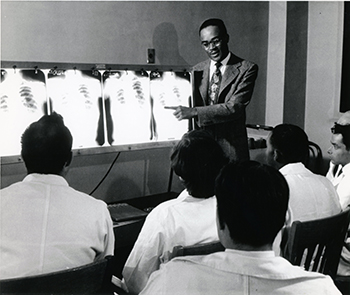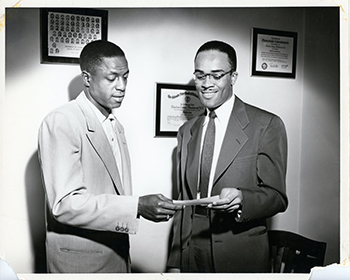Charles J. Blackwood, MD, Fund Created
Scholarship endowment honors school’s first black graduate
By Ken McConnellogue
 (April 2021) Charles Blackwood, MD, entertained thoughts of running off to join a band after graduating high school in the late 1930s in the small southern Colorado town of Trinidad. But his family, seeing his academic talent and potential, encouraged college instead. His older sister was convinced he would become a doctor.
(April 2021) Charles Blackwood, MD, entertained thoughts of running off to join a band after graduating high school in the late 1930s in the small southern Colorado town of Trinidad. But his family, seeing his academic talent and potential, encouraged college instead. His older sister was convinced he would become a doctor.
Her conviction proved correct.
After graduating with honors from Trinidad State Junior College and earning a chemistry degree as a scholarship student at the University of Colorado Boulder, Blackwood became the first Black graduate of the CU School of Medicine in 1947.
And now his legacy will endure with the Charles J. Blackwood, MD, Endowed Memorial Scholarship at the CU School of Medicine, announced in February. The endowment will initially provide funding for full scholarships for at least four students from backgrounds underrepresented in medicine who have a demonstrated commitment to the African American community. The school intends for the endowment to grow so it can support additional scholars in perpetuity.
The idea for naming the scholarship endowment for the medical pioneer emerged from the Mile High Medical Society (MHMS), an organization of Black physicians and health care professionals. It collaborated with CU to raise more than $1 million for the scholarship. CU School of Medicine Dean John J. Reilly, Jr., MD, and CU President Mark Kennedy each contributed $1 million to match the philanthropy.
Yet there were times when the endowment seemed far from a reality, said MHMS’s Terri Richardson, MD, an internist at Kaiser Permanente and one of the leaders of the fundraising drive.
“It was a dream. I thought at many times it was an impossible dream, but to really see this happen, I can't even hardly contain my emotion that this actually happened,” she says. “It shows how you can start with a seed, with a dream, and it can become reality. We saw that we have a lot of supporters and champions out there that also believe that this is a great cause.”
It's a great cause that also aligns with a primary focus at the CU School of Medicine, said Reilly.
“I think the Blackwood scholarship represents a very visible example of our commitment to diversity. It represents the culmination of a partnership with the Mile High Medical Society that began about four years ago when we started fundraising for this scholarship,” Reilly says. “And it allows us to recognize the contributions that African-American physicians have made at the school and in Colorado.”
Blackwood is an excellent namesake for the scholarship, he said.
“To be the first African American to graduate from our School of Medicine, to be a visible role model in the community, as a person of color, practicing medicine, to be able to build trust with patient populations that have historically had reasons not to trust the medical establishment, were all heavy responsibilities for him. But by all accounts, he performed them very, very well.”
It wasn’t an easy road for Blackwood. During his medical education, he could only sit in certain places in lecture halls and his living arrangements were separate from the rest of his classmates. Yet he graduated in the top 10 in his class. After an internship at Harlem Hospital in New York, he returned to Colorado to complete his residency at Colorado General and Denver General hospitals.
Blackwood had a long and successful career in private practice. Additionally, he served on the staff of Colorado General Hospital as an instructor in the medical clinic and on the staff of General Rose Hospital. He served in the U.S. Air Force from 1952 to 1955 and led efforts to establish the Radiology Department at Hamilton Air Force Base in California. He was honorably discharged as a captain and returned to Denver, where he was appointed to the medical staffs of St. Luke’s Hospital and General Rose. He was the first Black physician on staff at St. Luke’s. He was also the first Black clinical professor of medicine at the CU School of Medicine.
According to Richardson, during Blackwood’s years of practice, he had many patients who could not pay for their treatment, but he never turned them away. Some of his former patients still talk about his kindness, compassion, and the great care he provided.
Reilly says the collaboration with the MHMS was important not just to raise funds for the scholarship, but also to provide additional support systems for students who can carry forward Blackwood’s legacy of kindness, compassion, and care.
“I think this scholarship is a visible evidence of that partnership, but more importantly, or as importantly, is to have the members of the Mile High Medical Society engaged in providing mentorship and clinical advice and clinical experiences for our medical students,” he says.
One of those students, Stephanie Nwagwu, agrees that supporting future physicians will help meet critical community needs. She is entering her final year at the school after taking a break to earn a master’s in public health and health management from the Harvard T.H. Chan School of Public Health.
 “I think it’s incredibly important to ensure that we have a diverse workforce when it comes to medicine. Studies have shown over and over that diverse teams work better. And studies keep showing that when people are taken care of by a team that is more diverse or the workforce looks like the patient population they are serving, those patients are served better and there’s better health outcomes,” she says.
“I think it’s incredibly important to ensure that we have a diverse workforce when it comes to medicine. Studies have shown over and over that diverse teams work better. And studies keep showing that when people are taken care of by a team that is more diverse or the workforce looks like the patient population they are serving, those patients are served better and there’s better health outcomes,” she says.
Nwagwu said recognizing the pioneering efforts of physicians like Blackwood is critical.
“It’s really important that we really show appreciation for the people who came before us and the people who opened the doors for us. It’s not easy to be the only person of color, the only Black student,” she says. “We know that there were many challenges that Dr. Blackwood had to face. And because he faced those challenges, the doors are more easily accessible to students like me.”
CU President Mark Kennedy says the collaboration among the scholarship’s funders to help open doors was impressive, but perhaps more so is the result it will have.
“What makes me so excited about this scholarship is that it’s important in a medical setting, because you think of the times in your life when you’re most under stress, when you really want to have somebody that you feel connects with you and understands you, and being able to have more medical professionals who are reflective of the population is vitally important,” Kennedy said.
Serving that broader community is a vital aspect of the effort, says Richardson.
“My best hope is that we will attract the brightest, sharpest students to receive this endowment that will come out of school and become true community doctors where not only do they provide great medical care, but they provide care for our community so that we can be as healthy as possible,” she says.
Reilly says the Blackwood Endowment is an important focus of the school’s commitment serving diverse communities, but not the only one.
“This represents but one facet of our ongoing commitment to creating a diverse and inclusive student body at the School of Medicine,” he says. “Additionally, we have the scholarships created by one of our alumni, George “Doc” Lopez, that currently supports eight students who come from underrepresented backgrounds. The Anschutz Foundation has contributed to an endowment for scholarships.”
Nwagwu said her own experience validates the school’s approach.
“When you ask an institution what’s important to them, you can normally see the answer by where they put their dollars. If an institution says diversity is important, and they’re not investing actual dollars into students, you know it’s not that important to the university,” she said. “It’s really important not only to give students the opportunity to not have to worry financially about paying tuition, but also showing that these students are important to us.
“Medical school is incredibly expensive, and just even applying to medical school is expensive. When there are scholarships available, it opens up a window of opportunity for so many people.”
Richardson says it’s great to reach fundraising milestones, but notes the effort is ongoing. Contributions can be made at https://giving.cu.edu/fund/charles-j-blackwood-md-endowed-memorial-scholarship-fund.
“No donation is too small. If you've got $5, put it in our pot. If you have $1 million, call me up right away, but anything in between will do,” she said.
Blackwood died in 1993, but he lived for his patients and his community. His namesake endowment is not just a powerful legacy, but an inspiration for generations of physicians to come.